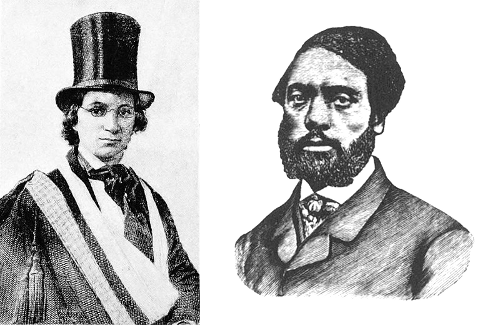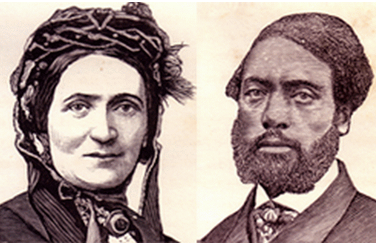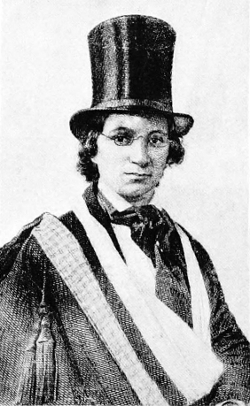
Georgia slaves Ellen and William Craft made a daring bid for freedom in 1848: Ellen dressed as a white man and, attended by William as her servant, undertook a perilous 1,000-mile journey by carriage, train, and steamship to the free state of Pennsylvania in the North. In this week’s episode of the Futility Closet podcast we’ll follow the couple’s harrowing five-day adventure through the slave-owning South.
We’ll also discover the best place in the United States to commit a crime and sample the aphoristic poetry of Danish mathematician Piet Hein.
Our post on Ellen and William Craft appeared on July 19, 2012. Here are the two as they normally appeared:

And here’s Ellen dressed as a rheumatism-ridden white man:

In order to show her likeness clearly, this image omits the poultice that she wore on her chin.
Their book Running a Thousand Miles for Freedom appeared in 1860. Here’s an excerpt explaining what awaited them if they were confronted at any point on their 1,000-mile journey:
If [a] coloured person refuses to answer questions put to him, he may be beaten, and his defending himself against this attack makes him an outlaw, and if he be killed on the spot, the murderer will be exempted from all blame; but after the coloured person has answered the questions put to him, in a most humble and pointed manner, he may then be taken to prison; and should it turn out, after further examination, that he was caught where he had no permission or legal right to be, and that he has not given what they term a satisfactory account of himself, the master will have to pay a fine. On his refusing to do this, the poor slave may be legally and severely flogged by public officers. Should the prisoner prove to be a free man, he is most likely to be both whipped and fined.
At several points whites upbraided Ellen for treating William decently. On the steamer to Charleston, a Southern military officer told her:
You will excuse me, Sir, for saying I think you are very likely to spoil your boy by saying ‘thank you’ to him. I assure you, sir, nothing spoils a slave so soon as saying ‘thank you’ and ‘if you please’ to him. The only way to make a nigger toe the mark, and to keep him in his place, is to storm at him like thunder, and keep him trembling like a leaf. Don’t you see, when I speak to my Ned, he darts like lightning; and if he didn’t I’d skin him.
Our post about the Woodrow Wilson Bridge appeared on June 4, 2014, and we wrote originally about the Yellowstone loophole on Feb. 3, 2012. Michigan State law professor Brian Kalt’s paper about the loophole is titled “The Perfect Crime.” He points out that civil actions and lesser criminal charges await anyone who commits a felony in Yellowstone; nonetheless he calls the current state of affairs “a constitutional rusty nail.”
We’ve published Piet Hein’s poetry previously on Futility Closet, in 2012 and 2013. Wikiquote has the fullest online collection I know of.
You can listen using the player above, download this episode directly, or subscribe on iTunes or via the RSS feed at http://feedpress.me/futilitycloset. The show notes are on the blog. Many thanks to Doug Ross for the music in this episode.
If you have any questions or comments you can reach us at podcast@futilitycloset.com. Thanks for listening!
